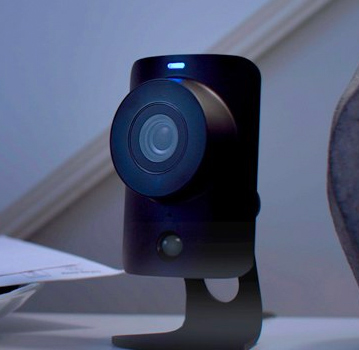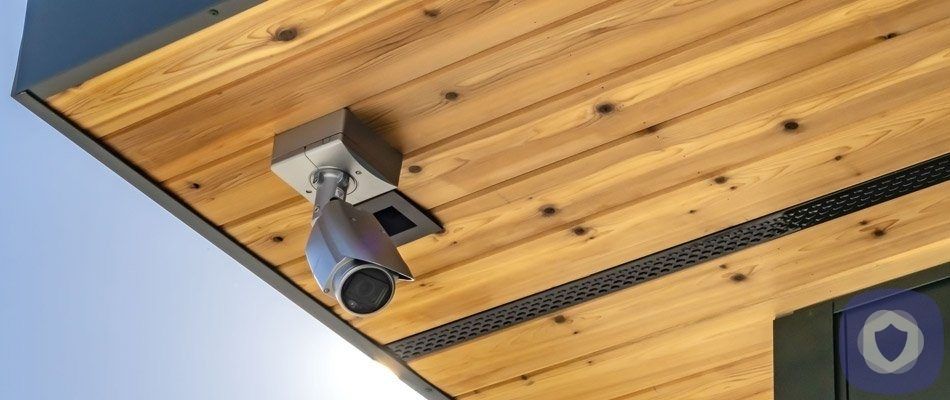Both indoor and outdoor cameras are usually available as an add-on or as part of an upgrade to a home security package. These cameras are valuable tools that show you what’s going on in your home while you’re away and they’ll give you the peace of mind that comes with knowing that your property is surveilled while you’re sleeping.
Convinced you should get a camera and debating about an outdoor one, an indoor one, or both? Here’s what to consider when comparing indoor vs. outdoor security cameras.
Indoor vs. Outdoor Security Cameras: The Main Differences
Functionality
First, ask yourself whether you want to keep an eye on the interior or the exterior of your home. This sounds obvious, but it comes down to your specific wants and needs. For example, do you want to see that your child is safe at home after school or that your pets are behaving? Then an indoor camera is the way to go.
Indoor cameras typically show you wants going on in a room, but you can also point them toward an exterior door so you can see when anyone enters.
Outdoor cameras tend to be more about security surveillance. If you are concerned about trespassing or burglary, or you want to see when your packages get delivered, then outdoor cameras may be for you. (Check out our guide on where to place your security cameras.)
General Durability
Outdoor cameras are generally built to be more durable. They’re weatherproof, so they can handle rain, wind, and extreme temperatures. They could be tampered with, so they need to be made of durable materials—usually metal and/or with sturdy casings—so vandals can’t destroy them or remove them easily.
For that reason, outdoor cameras tend to be bulkier and not always so attractive. Indoor cameras can be smaller and more lightweight, since they don’t need to withstand as much of a beating. You may even be able to get wireless cameras for indoor use, so you can easily reposition them around your home. Outdoor cameras would need to be fixed in place, so others can’t move them.
Cost
Because indoor cameras don’t need to be as heavy duty, they tend to cost less than their outdoor counterparts.
Privacy factor
If you’re not into the idea of cameras monitoring your family’s every move, then you might not want to place them inside your home. Know that it’s possible for security system cameras to get hacked. (More on that down below.)
Also, consider the privacy of visitors to your home. Some states require parents tell babysitters and nannies if they have cameras in their home, and many caregivers consider this disclosure common courtesy.
What to Look For In Both Indoor and Outdoor Cameras
Motion detection vs. live streaming video
When choosing an indoor or outdoor camera, it’s important to understand the difference between motion detection and live streaming surveillance. If your camera operates with motion detection, that means it gets triggered to start taking footage when it senses motion. This is valuable to staying updated on your home security because you can get alerts when that motion is detected—for example, when a package gets delivered, or your teen gets home from school.
Live streaming video cameras mean you can log in at any time and see what’s happening in and around your home. This is useful if you’d like to check on things from time to time, regardless of motion detection. You may want to consider a camera with 24/7 video recording, so you can play back video from throughout the day, not just when motion is sensed.
Picture quality
Resolution affects how sharp a picture you’re going to get from your camera. If you want a good quality view of your home and its surroundings, look for a higher resolution camera. If you’re only looking at target area in short range, you may be able to get away with a slightly lower resolution. Also, check the night vision capabilities of the camera. Both indoor and outdoor cameras should work well in low light.
Also, know that most indoor cameras aren’t built to adjust to different light levels the same way outdoor cameras are, so placing an indoor camera near a window isn’t likely going to give you as good view of your yard at night, the way an outdoor camera would.
Wired vs. wireless
Outdoor cameras are almost always wired, since they need to be mounted permanently. Indoor cameras can be mounted and attached to a wired system, but some can be wireless and work using batteries. The upside to wireless cameras, is of course the portability factor, and you also don’t need a pro to install them. You will need to keep up on battery changes though.
Tips for making sure your cameras don’t get hacked
The last thing you want is for a stranger to see inside your home or your private property, so when buying an indoor or outdoor camera, take as many steps as you can to prevent getting hacked. This includes:
- Setting up a unique and difficult-to-guess username and password
- Changing that password periodically
- Not using public WiFi to access your security system
- Checking logins to see if there’s any unusual activity
- Keeping a lookout for strange changes, such as your camera moving without your directive or lit up without you activating it
With a security camera, you’ll make a big upgrade to your security system that can really add to its functionality and your own peace of mind. In making the decision of indoor vs. outdoor security cameras, the biggest consideration should be how you’ll want to use that camera in or around your home. From there, you’ll factor in cost and features to choose the right device for your family.
Our Pick: SimpliSafe Camera
The SimpliSafe camera functions as both an indoor and outdoor security camera with the addition of a separate cover to protect it from the elements. This gives you the most versatility, as you can always move the cameras where they're needed.

This article has been reviewed and approved by Officer Banta.

Officer Banta is the official SecurityNerd home security and safety expert. A member of the Biloxi Police Department for over 24 years, Officer Banta reviews all articles before lending his stamp of approval. Click here for more information on Officer Banta and the rest of our team.

